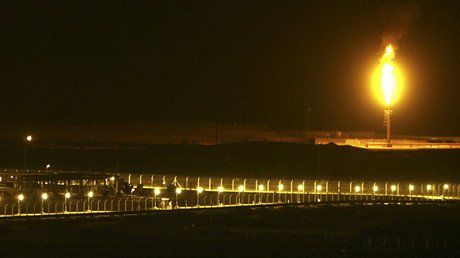Oil soars as OPEC reaches deal to limit production first time in 8 years
Crude prices gained six percent after the Organization of the Petroleum Exporting Countries (OPEC) reached a deal to cut oil output. Starting November, production is to be reduced to a range of 32.5-33.0 mn barrels per day.
“OPEC made an exceptional decision today. After two and a half years, OPEC reached consensus to manage the market,” Iranian Oil Minister Bijan Zanganeh has said on Wednesday, as cited by Reuters news agency.
“We have decided to decrease the production around 700,000 barrels per day,” Zanganeh added.
The cartel estimates its current output at 33.24 million barrels per day.
Reuters reports that OPEC will settle production levels for each member country at the next formal meeting, set to be held in Vienna on November 30. It will be the first reduction in eight years.
One of the sources also told Reuters that after reaching the target production rate, OPEC will turn to non-OPEC producers for output support.
Representatives of the OPEC countries are currently in Algeria attending the International Energy Forum.
The agreement to cut production among the world's largest oil producers could lead to oil supply coming more in line with the demand for the energy source.
Following the reports of OPEC's decision, the price for futures for Brent crude oil has gone up by nearly 6 percent, to $48.72 per barrel on the ICE stock exchange in London by 6:28 pm GMT.
US West Texas Intermediate (WTI) crude oil also rose by 5.4 percent, to $47.02.
#Algeria 3 key OPEC governors Iran, Saudi and Venezuela looking cheerful while ministers hold their closed session pic.twitter.com/oiC63PXdaL
— Rania El Gamal (@Rania_ElGamal) September 28, 2016
US energy stocks have also jumped, with the energy sector gaining 3.9 percent, the most among the S&P 500 11 sectors. The benchmark index is up eight points (0.39 percent), the Dow is up 89 points (0.48 percent), and the Nasdaq is up six points (0.13 percent) as of 6:28pm GMT.
Spot gold prices fell 0.4 percent, to $1,322.35 an ounce.
The Dow Jones industrial average rose 0.61 percent and the Nasdaq Composite added or 0.24 percent.
Meanwhile the euro exchange rate against the Russian ruble on the Moscow stock exchange fell by 89 cents compared with the level it had at the closing of the previous trading session and reached 70.74 rubles per one euro.
The Russian ruble also rose in price against the US dollar by 1 percent, or 79 cents.
READ MORE: Iran not ready to freeze oil output with other producers at Algeria meeting
U.S. stocks end higher after reported OPEC agreement sends oil soaring
— Leonid Asmus (@Leonid_Asmus) September 28, 2016
Last week Iran, OPEC’s third-largest producer with a daily output of 3.6 million barrels in August, declined a suggestion from Saudi Arabia that it freezes production at January levels if Tehran agrees to do the same. Tehran said it will continue increasing oil output until it produces four million barrels a day.
On Tuesday, however, Saudi Oil Minister Khalid Al-Falih signaled that it may accept the idea that Iran maintains its output at maximum levels but said it doesn’t expect an agreement to be reached this week, stating that a deal in November is possible.
The politics behind the OPEC agreement is even more important than the economics, believes Mark Thornton, senior fellow at the Ludwig von Mises institute.
“This is a sign that the Middle East is starting to move in [the direction of] cooperation,” Thornton told RT. “Their backs [are] against the wall, and I think they realize that cooperation right now in oil, and questions of peace are very important … these are signs that an era of cooperation in the Middle East is starting to emerge, and I think the Iranians especially realize that.”
It is Saudi Arabia who is "desperate" to reach a deal and is losing the most from it, believes the publisher of the Trends Journal, Gerald Celente.
“It’s Saudi Arabia’s desperation. Their policy that they put in place in 2014, when oil prices began to go down, was to drive out high cost producers, and it’s failed,” Celente told RT. “Saudi Arabia is now facing a budget deficit of $100 billion a year, you see strikes going on from people not getting paid, they’ve just cut back on government employee raises, bonuses, etc. And 70 percent of Saudi people are employed by the government. So it is Saudi Arabia that is really beginning to bend, because they are in a financial crisis and waging war in Yemen … so I think they’re the ones that are trying to come to a deal.”
The negotiations between OPEC representatives that lasted some six hours ended with a press conference during which the Head of OPEC Mohammed Bin Saleh Al-Sada called the decision a “historical” one. Al-Sada added that a special committee had been set up to consider the output share of each member nation and coordinate a collective agreement with non-OPEC producers.













